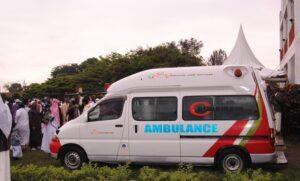At least 43 people were killed when Islamic State-supported militants attacked a Catholic church in eastern Democratic Republic of Congo on July 27, 2025, according to several reports from civil society representatives and security officials.
The assault took place around 1 a.m. at a Catholic church in Komanda, in the Ituri province of eastern Congo. Armed with guns and machetes, members of the Allied Democratic Forces (ADF) stormed the church during an overnight mass, focusing their attack on worshippers assembled for the service.
Dieudonne Duranthabo, a local civil society coordinator, said that more than 21 people were fatally shot both inside and outside the church. He also noted that at least three burnt bodies were found and multiple homes were torched, with search teams still working at the site.
Reports on the number of casualties varied. While Duranthabo cited over 21 deaths, other authorities gave higher numbers. A UN-backed radio station quoted security sources saying 43 people were killed, while local news sources stated the death toll might exceed 40. Confirmed lists of victims included 19 men, 15 women, and nine children.
Lieutenant Jules Ngongo, spokesperson for the Congolese army in Ituri, confirmed that ten people died in the church attack. Military sources said armed men wielding machetes massacred worshippers and set nearby shops on fire before escaping the area.
Earlier that night, the attackers also targeted the nearby village of Machongani, where at least five more people were killed. Lossa Dhekana, another civil society leader in Ituri, mentioned that several villagers were abducted, with their whereabouts and the exact number still unknown.
Authorities have blamed the ADF for both incidents. Reports indicate the group originated from a stronghold roughly 12 kilometers outside of Komanda and had already fled by the time security forces responded.
Footage from the scene showed burning buildings and bodies lying on the church floor. Witnesses who recognized the deceased were seen grieving loudly while others stood, shocked, amid the destruction. The attack also resulted in several houses and stores being set ablaze.
Duranthabo denounced the attack, expressing frustration that such violence could take place even with security personnel present in the town. He called for urgent military action and warned that the attackers remained nearby.
The ADF arose in Uganda in the late 1990s, composed of groups unhappy with President Yoweri Museveni’s rule. After military operations by Ugandan forces in 2002, the group shifted its activities into neighboring Congo and since then has killed thousands of civilians.
In 2019, the ADF swore allegiance to the Islamic State and has maintained an ongoing relationship with the group. Operating mainly along the Uganda-Congo border, the ADF regularly targets civilian communities.
Earlier in July 2025, the ADF carried out another massacre in Ituri province, leaving dozens dead, in what a UN spokesperson labeled a bloodbath. The group’s leaders are reportedly attempting to establish an Islamist administration in the East African region.
Eastern Congo has long suffered from deadly violence perpetrated by various armed groups, with ongoing conflict dating back to the aftermath of the 1994 Rwandan genocide. The United Nations reports that more than 100 militias operate in the area, including the M23 rebels supported by Rwanda.
The Congolese military has struggled to control the ADF, especially as confrontations with the M23 rebels intensify. Joint operations by Congolese and Ugandan forces have offered limited relief to local civilians in the face of continued ADF attacks.
Komanda, part of mineral-rich Ituri province, is no stranger to conflict. The recent attack has heightened concerns about worsening humanitarian conditions, in a country where approximately seven million are displaced among a population of 106 million.
The Congolese government condemned the massacre at the church, calling it horrific, as military leaders described the event as a large-scale revenge attack in response to recent security actions against the ADF. The UN peacekeeping force warned that such violence would further deepen the province’s already dire humanitarian crisis.
Many victims’ bodies remained at the church while volunteers organized a mass burial on church grounds. In the aftermath of the attack, Komanda came to a halt as Congolese soldiers, Ugandan troops, and local police carried out searches for those responsible.

